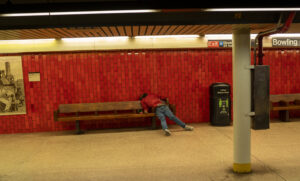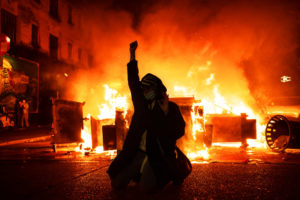I set off last Wednesday on a three-week road trip around the United States. I had high expectations drizzled in nostalgia, since I was repeating a project I’d done exactly nine years before: the idea, then and now, was to talk to people about the American Dream. I was hoping to get a sense of the mood of America ahead of the November election.
In that spirit, my first stop was Scranton, a city in northeast Pennsylvania. The downtown nearing dinner time was empty except for professionals dashing from cubicles to cars, and the destitute hiding in nooks from the lingering heat, emerging only to ask for money, either via long lies or by pleas to my empathy.
My motel, a run-down, squalid place that at $45 a night was still extortionate, was at least social, with the buzz of a long-term residency, which was what it was for everyone there but me. My fellow guests were outside smoking and drinking in the only fresh air and view they had.
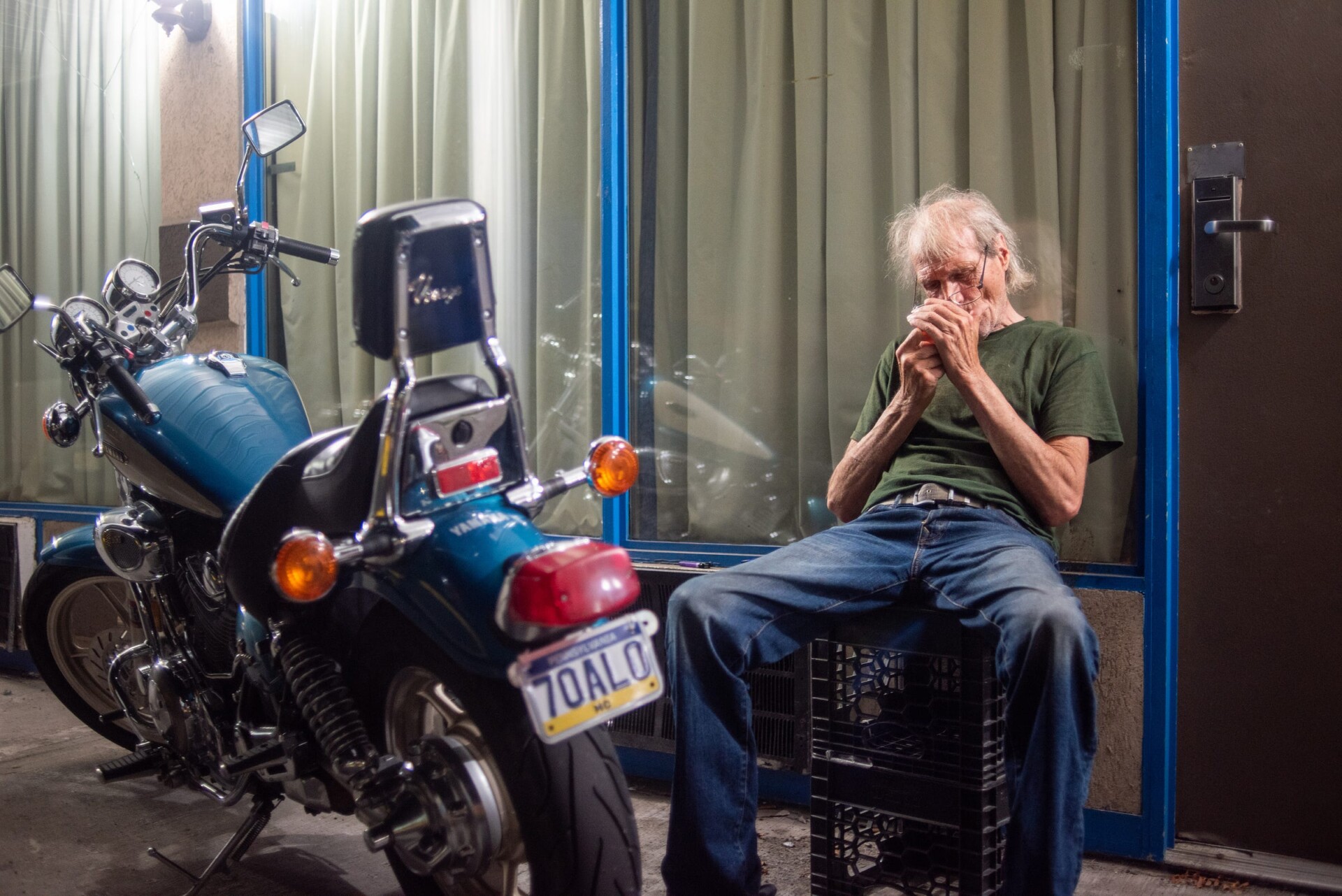
Kevin, who was sitting on his milk crate “lawn chair” chain-smoking Criss Cross cigars, was the most talkative. He was a lifelong union Democrat, who, before I could finish asking “What do you think the American Dream is?”, snapped back: “It doesn’t exist these days, it was ruined by Reagan in the Eighties.” He then commenced a chronicle of his last 50 years of ups, and mostly downs, that began with “I got a degree in computer science from University of Scranton” and ended with “I don’t have hope. I understand why there’s so many druggies out there.” His tale was peppered with detours into local gossip about who’s a pervert (the guys drinking in the beat-up Accord watching us), who’s hard-working (his smoking friends on the other side of the motel), who’s an incompetent dumb thief (his brother), and so on, with most of his wrath directed at the CIC (Community Intervention Center), Donald Trump and the Sackler family.
The next morning, after a night of heavy rain, loud music and unexplained loud blasts, Kevin was where I’d left him, joined by John and Dewey who together completed America’s political triarchy of “Trump’s my man” (John), “Trump’s an ignorant asshole” (Kevin), and “Neither. Nothing’s going to change. Nothing. They don’t care about us people” (Dewey)
Dewey and John were passing the time, waiting for their boss to pick them up. As it was raining, they’d probably miss out on the $150 cash they got for a day’s work painting. And given rent in the “shit-hole was $1,500”, that really sucked.
Both were less talkative than Kevin, although not out of impoliteness. John was a tad shy, and a little confused as to why someone as educated as me wanted to hear his views. He was from McDowell County, West Virginia, and had come here for work, and to get a “change of location, and change of situation” since that was the only way to stop the heroin. He’d been on it a little, way back when he was a kid, but “he came out of it, with no rehab, but by willpower”, something all his high-school friends and family didn’t seem to have. He wanted to stay here because if he went back he’d “judge them harder than God for still putting needles in their arms”.
John thought the American Dream was “going downhill”, while Dewey burst out laughing at the question, followed by a loud “Shiiiiiiiiiiiit. That’s long ago dead”. He then launched into a soft-spoken condemnation of people on welfare, including some of the other residents, who “walk around all day doing nothing, drinking liquor, shooting smack, getting $700 a week, while I work my ass off and get less than them. That ain’t right and I wouldn’t vote for no politician who supports that bullshit, and they all support that bullshit.”
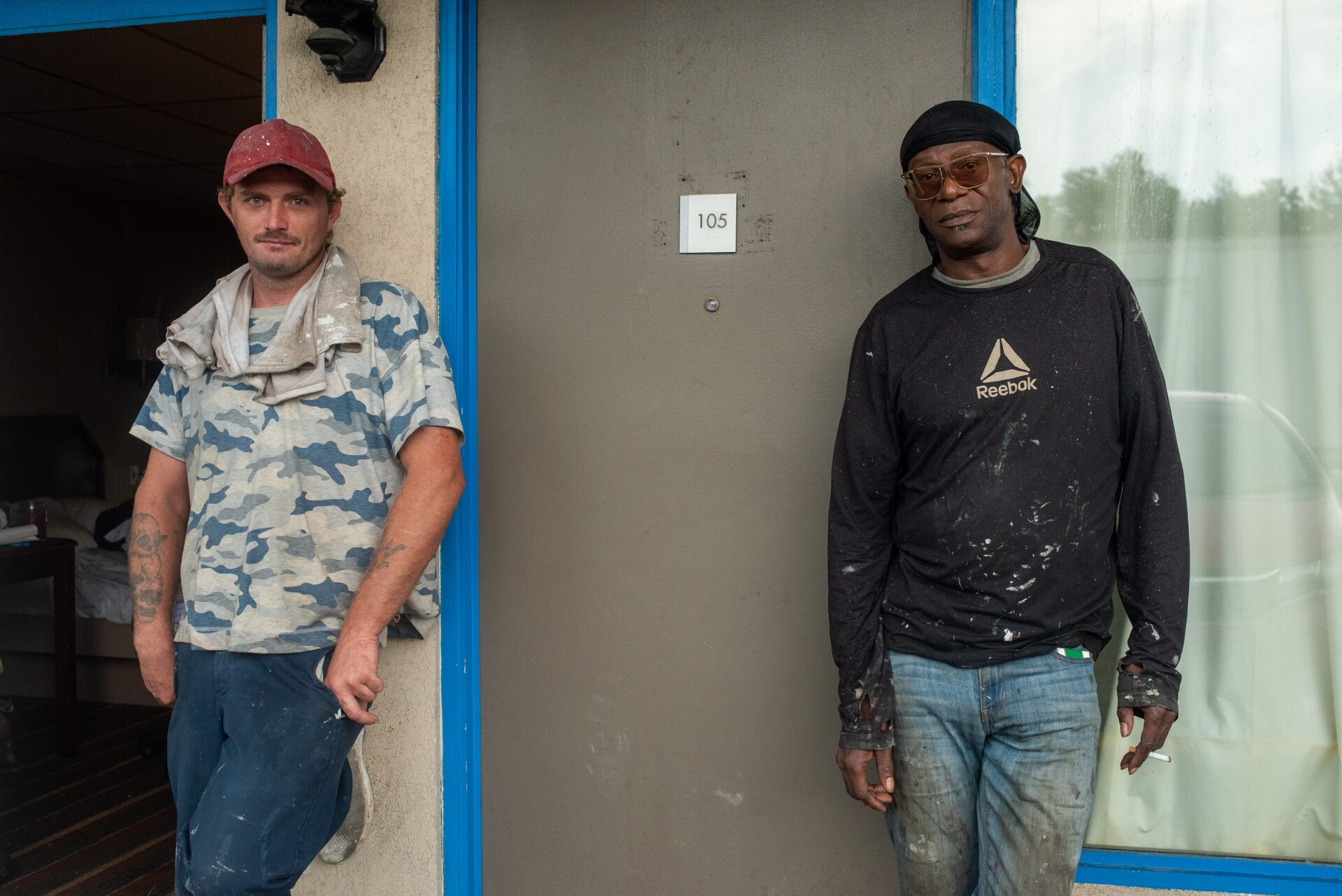
I tried to spend the rest of the morning walking around Scranton talking to strangers, but the rain, heat and emptiness made for a desolate beginning to the day. Hoping for something a little more buoyant, I drove to Wheeling in West Virginia. But I soon found I’d stepped further into the gloom. I’d remembered Wheeling as a busy, active and alive town, albeit a bit forlorn, but there was none of that this time. Even on a Friday night, the downtown had the energy of a patient on life support: there was still a heartbeat, but it felt feeble and artificial.
When I remarked on the town’s emptiness, Mike at the Carin pub was bemused by my naivety. “There used to be 15 bars in the area, one on every corner, but those all died after the steel mills left and we are hanging on only because our regulars are too stubborn to go anywhere else,” he said. It was unlikely any of them would agree to an interview: “The only people you going to find around here are too messed up to talk.”
Mike was firmly in the no-point-voting camp (“I’d rather vote for Mickey Mouse than any of these corrupt idiots”), and when I asked him what he thought about the American Dream, he asked: “Is that like a show on TV?” When I repeated “no, you know, the American Dream”, he burst out laughing: “Hell no, that died 40 years ago.”
The next morning, though I was still committed to my three-week trip, I was beginning to waver. I still hadn’t walked anywhere — the landscape of the last few days was too sparse and too hot for that — and it was beginning to grate on me.
My next interaction — with Luther, who was buying packs of cigarettes in a gas station across the river in Belmont, Ohio — was another gut punch to my spirit:
Me: What’s the American Dream?
Luther: What American Dream anymore? I’m too old to dream anyways because I got lung cancer, so no sense in dreaming.
Me: Oh shit, I’m sorry. What stage is your cancer?
Luther. Don’t know, don’t want to know. The doctors said I got it, and to come back, but I’m not doing that. Chemo kills you.
Me: I’m sorry, but maybe…
Luther: Nope. I’m done and living one day at a time, doing my best. I got baptised on my 61st birthday, so I fixed myself for what’s coming.
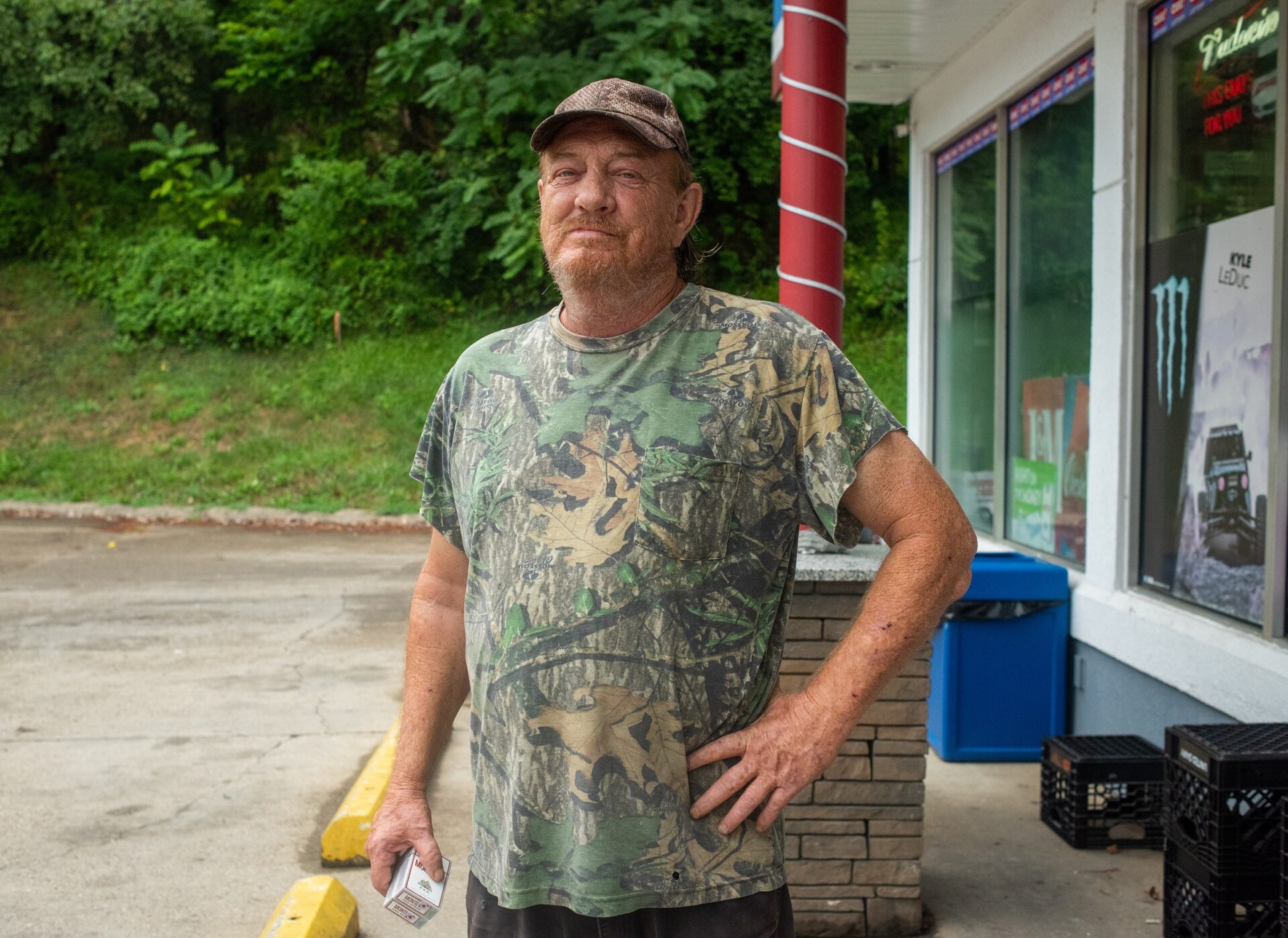
The rest of the day spent driving to Bristol, Tennessee, hearing more stories of pain, apathy and destitution and resting in blazing ugly strip malls, cracked my desire to continue with the trip.
Why did I decide to give up? While driving through some of America’s most majestic natural beauty, I was reminded that almost everything man-made in the landscape was ugly: bland pre-fab buildings that looked like they were airlifted in and plopped down in plots of land bulldozed flat, with zero shade or attempt to integrate them into the surrounding nature.
It didn’t help that I was also feeling physically gross, unable to walk and eating trash. That’s what’s almost exclusively available on the road in the US, because that’s what most Americans eat: great globs of fat and sugar. Indeed, America’s diet, outside of a minority of successful neighbourhoods, has grown worse since my last American Dream trip, with everything now somehow bigger, sweeter and fattier. This mass-produced, highly-processed gunk has about as much in common with what the rest of the world considers food as pornography does to intimacy.
There are still a few remaining culinary oases, with some vestiges of the communal and authentic still lingering in family-run Mexican restaurants. But even they’ve started to feel formulaic, and given over to pushing the most calories, the most grease, the most cheese, the most fat, because that’s what most people seemingly want.
Nine years ago, I didn’t think what we built and what we ate mattered that much; it seemed a small problem dwarfed by the much bigger issues of heroin addiction, suicides, joblessness and spiritual emptiness. Yet perhaps our gross food and bland environment are integral to the problems. Wolfing down four doughnuts and a Kit Kat Frappuccino from the Dunkin’ in a concrete plaza denuded of trees, or two bacon, egg and cheese biscuits from the Sheetz at the intersection of two eight-lane roads, in your car on the way to work, is no way to live. By boiling life down to the most utilitarian goal of maximising stuff and minimising cost, America has abandoned any trace of the shared communalism that the rest of the world understands as essential to a fulfilling life.
Our dismal culture has stripped everything of the sublime. And in doing so, it’s left the majority of Americans obese, flabby and despondent. You can’t separate physical and mental health which, like the two weights of a Bolas, are connected, each pulling the other further in the same direction. Right now, in the US, that direction is despair.
When I woke on the third morning of my trip, I knew I was done. I’d heard enough to know I wasn’t going to learn anything new. In the nine years since my last American Dream trip, I’ve come to realise I don’t like America, not as a place to live. We have an ugly, selfish, winner-take-all culture, devoid of community, meaning and the majestic, and almost all our policy is built around the notion that individual liberty, with the most stuff at the cheapest price, is the ultimate good. I don’t believe that, and my last three years spent travelling around the world have strengthened my view that while the US provides its citizens with the most opportunities, and the most stuff, we don’t give them the most fulfilling, beautiful and elevating lives.
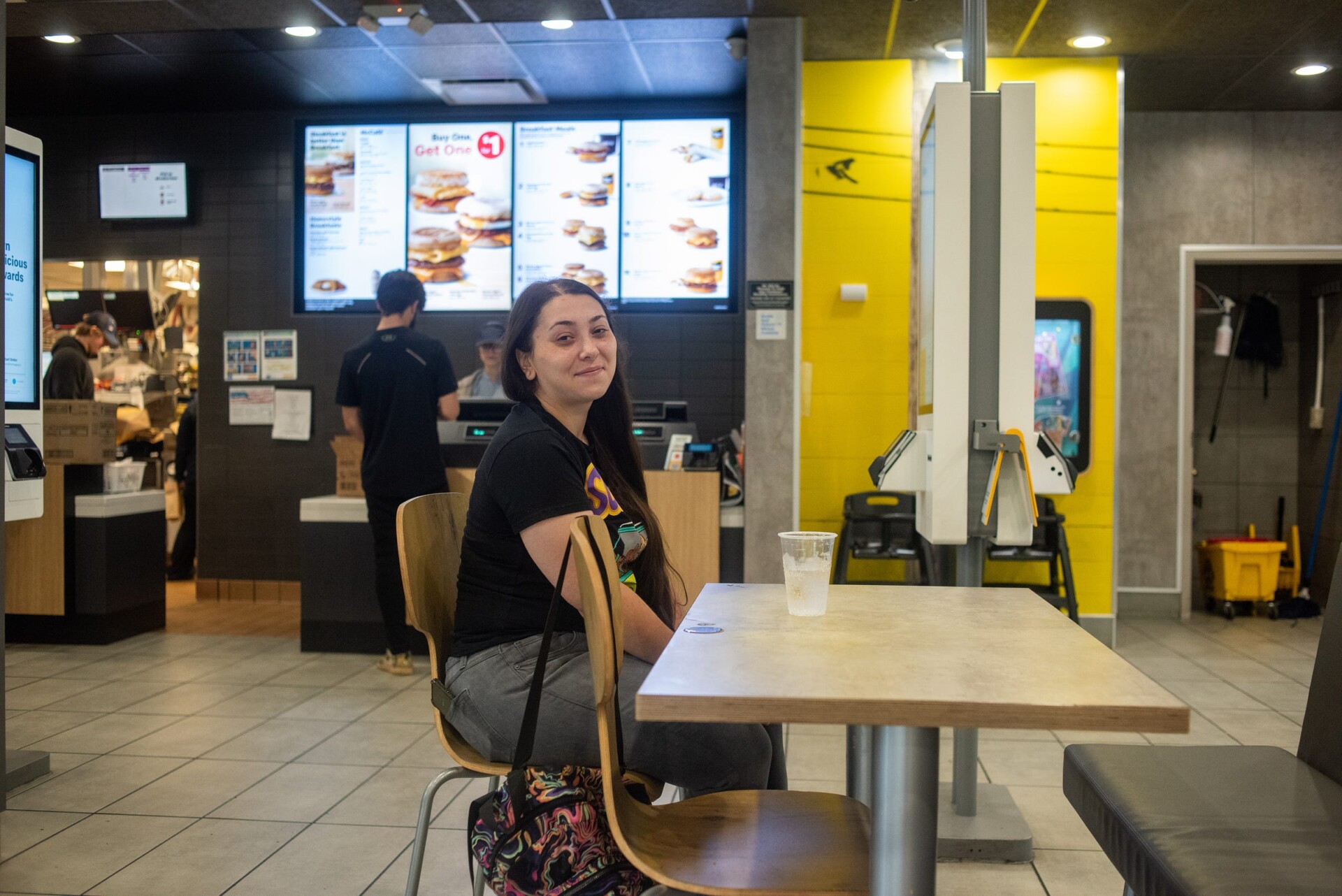
But while I might be done with the US, I’m not done with Americans, who have, like all humans, a tremendous capacity to endure. Take Caroline, who I found sitting alone in a Boston McDonald’s at 6am, drinking a cup of water, and playing on her phone. I didn’t know what to make of her. Curious about why she was there so early, but not wanting to make her uncomfortable, I left her alone until she joined me to vape outside, at which point she opened up.
She had moved to Bristol, Tennessee six months ago, after getting her “teeth knocked out through domestic violence”. She apologised for not speaking well as a result, although I didn’t notice. Originally from Grundy, Virginia, “a little coal mining town in the middle of nowhere”, she’s now living in a homeless shelter, “which is a little rough” but safer than Grundy. She tells me that after “trying to kill me, putting me in the hospital for three days”, her abuser was set free the same day they put in him jail. “He made bail somehow, and they let him out, and he’s been on the run and they haven’t been able to find him since, so I’m here.” Her father, “a good man who worked in strip mining”, died in 2012, and her mother is “an addict out of my life”.
I asked Caroline if, after all her troubles, she still believed in the American Dream. “Yeah, you just got to work for it,” she replied. What else can you do but believe, she said, still laughing. I suggest that some people turn to drugs instead. “Been learning and seeing my whole life what it can do to you and cost you, and no.”
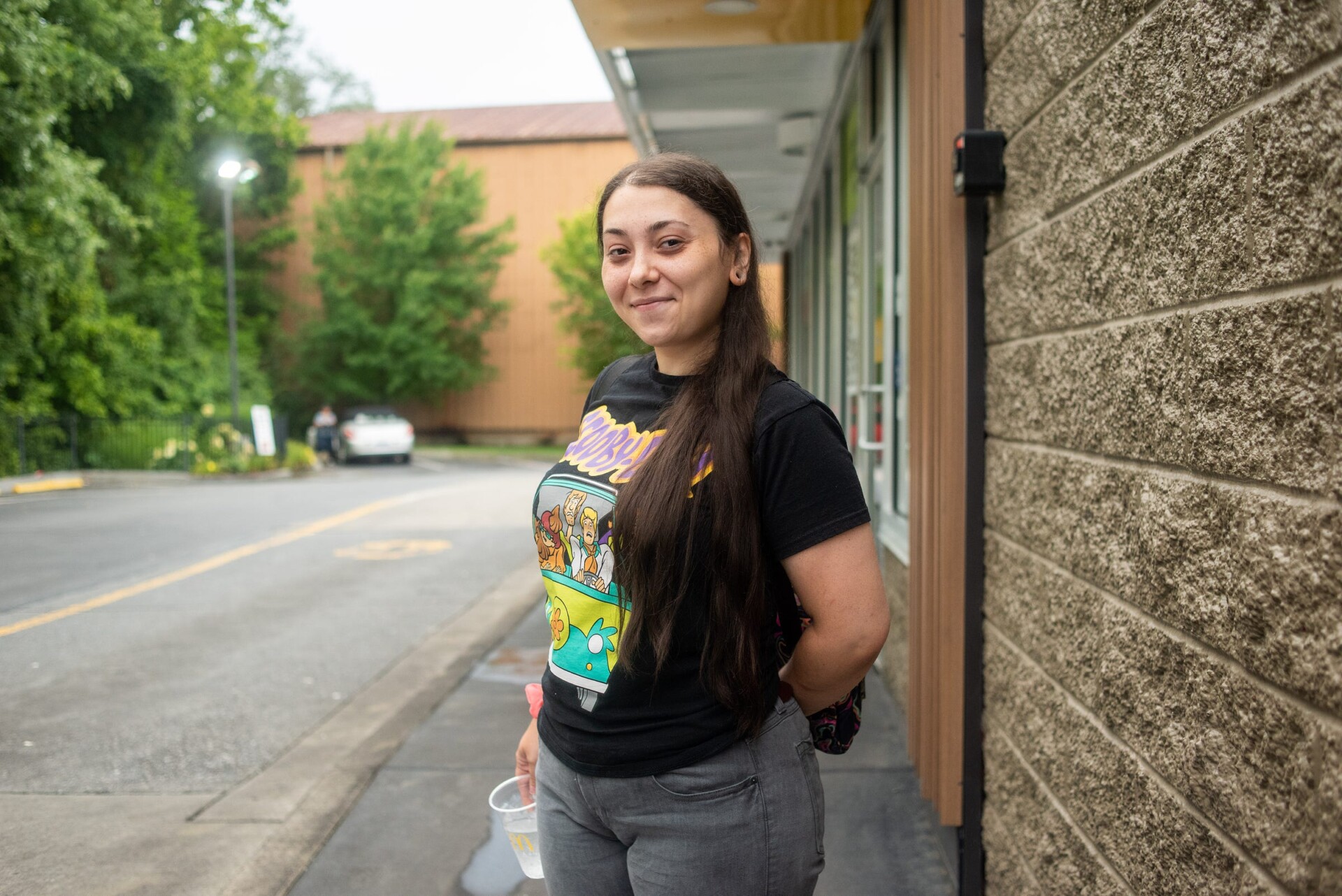
After talking to Caroline, I realised my trip was done. I wanted Caroline’s sanguine, sweet indefatigability to be the final and lasting image from my trip, because while America might be an ugly and unhealthy country, at least it hasn’t broken everyone’s spirit. At least there’s still an aspirational American Dream bubbling beneath the drab, treeless strip malls.
Driving home, thinking about why I gave up so early, I realised my negativity had little to do with America, which hasn’t changed much in the last nine years, and everything to do with me. That America hasn’t changed much, that it was all so familiar, is what I find so discouraging.
A decade ago, I had hope that things were so bad that we couldn’t possibly keep ignoring the malaise, the emptiness, the ugliness and we would move to right the ship. Instead, we buried our heads deeper into the sand, allowing life in the US to grow even more banal and isolating. We still haven’t grasped that the problem isn’t economic, it’s spiritual. And the answer isn’t to build another basic housing complex, another road, another shopping mall, but to build more cohesive and meaningful communities. Which isn’t easy, but unless that’s done, little will change towards the good, not in another year or another decade.
***
A version of this article was first published on Chris Arnade Walks The World.
Disclaimer
Some of the posts we share are controversial and we do not necessarily agree with them in the whole extend. Sometimes we agree with the content or part of it but we do not agree with the narration or language. Nevertheless we find them somehow interesting, valuable and/or informative or we share them, because we strongly believe in freedom of speech, free press and journalism. We strongly encourage you to have a critical approach to all the content, do your own research and analysis to build your own opinion.
We would be glad to have your feedback.
Source: UnHerd Read the original article here: https://unherd.com/

